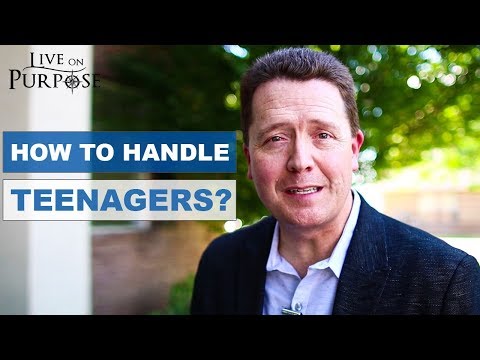
Have you noticed that as you start to pick up on your parenting skills and then suddenly your kids change the rules on you because they became teenagers? How about some positive parenting strategies for teens, today? Vicki and I have had the opportunity to raise 4 teenagers And we've participated on the parenting team of many, many other teenagers because of working in the schools in your case and my private practice
Teenagers are kind of a unique animal And so, where we start today 5 tips for you on positive parenting for teenagers Number 1, understand control and maturity Yeah this is so important because when we give our teenagers too much control before they have the maturity to handle it, it's a recipe for disaster for them and you
And on the other hand, if you withhold control when they're actually ready to receive it, they become resentful and angry Anybody know an angry teenager? Well, usually it's because of the control and maturity Quick review, there are 3 stages of moral maturity Stage 1, the least mature, is where we're selfish and self-centered and demanding and manipulative Does that sound like a teenager? Sometimes, you bet
Yeah So, it's about stage not age Right Now, at stage 2 is where we move from fighting to cooperating So, at stage 2, we don't want any trouble, we want to keep the peace
And so, we will negotiate and work with people When your teenager moves from stage 1 to stage 2, you as a parent back off and allow them to have more control because now they're morally prepared and mature enough to actually do that And then stage 3, oh that's the sweet stage Because at stage 3 they have responsibility And they take initiative to take care of things
They see what needs to be done and they do it Service, empathy All those kinds of things kick in in stage 3 So, as a parent we need to be extra sensitive when we're working with teenagers as to what stage they're on And there's a caveat, too
Be aware that they may change stages During the same conversation, they might be on stage 2 and then they start fighting with you and be uncooperative and they've gone back to stage 1 Then something you say might click in or something might flip back into stage 2 So, just be aware of those stages It makes a huge difference
I think this is probably more true for teenagers than it is for younger kids Yeah, I think they flip back and forth more often Right In other words, like your preschooler, for example Pretty much on stage 1, most of the time
And stage 2 because you're working with them on cooperation But you don't get a lot of stage 3 With teens, you'll look at this kid and think, "Oh, they are so amazing Oh, way to go" And they're doing this stage 3 stuff and then the next moment they're throwing a tantrum or ranting and raving about something of like a stage 1
So, a lot of variability with your teenager So, just for starting out Now, if you're not familiar with those 3 stages, we've given you a quick overview here But you can link to other videos here on the positive parenting playlist that will describe them even better That one about positive parenting
The other videos on this playlist will give you some deeper dives into those 3 stages And Vicki and I just finished recording the Parenting Power-Up audio course Where we just get into the nitty-gritty — the very details of it So, there's some other resources for you Tip number 1, understand control and maturity
Now, let's move right into tip number 2 Which has to do with your perspective Keep a positive perspective here There's a lot of adventures waiting for you as you parent teens Do you like that characterization? The adventure is probably a very good word
What else might we call it it? Could be a gut-wrencher What if you could pick between those two perspectives? Either it's an adventure or it's a gut-wrencher Which one do you want to sign up for? I think that has to do with however you frame this thing So, keep in mind that what you're experiencing here is an adventure And that helps you to show up better in your parenting
It will also have an impact on your teenager You know during this time of adventure, your child is developing at an amazing rate (Yeah) In a lot of different ways And I hear parents say when they're approached by other people who have interaction with your child saying And they describe a behavior that your child did and you say, "Oh, that's not my kid
That's not like my kid" Yeah That's such an interesting concept to look at because it's no longer the kid you remember This child is growing into a teenager A young adult
And they are a very different person And I think one of the things Going back to number one, understanding the stages of control and maturity, your 8-year-old child might have been in stage 2 and 3 quite frequently
But as different things happen in their life, as they grow into teenage years and get that confused feeling that often goes along with it They might be reverting back to stage 1 So, you're right It's not my kid Yeah, this is your new kid, this is your new teenager
And sometimes, you just want to get really clear that this is a whole new person growing Different animal Kids, teenagers — not the same thing Right And you're right Vicky
It can be very misleading especially if your child has been fairly mature and then your teenager is not so much That can be very frustrating to you as a parent So, keep that proper perspective So, let's go into number 3 now Here's how I'm going to phrase it
"Convey liking and enjoyment" Teens are very sensitive to this need-to-fit-in Right This is why junior high is so brutal, right? Because they're constantly looking around, "Oh, how do I fit in? Do people like me?" To like them, put you in a very select category And it gives you influence that you can't have it any other way as a parent
So, when I say convey, liking and enjoyment, you find a way in your own heart and mind to enjoy your teenager To sincerely like them and communicate that to them This isn't always easy No, but I think if we stay clear about the fact that we're talking about a teenager, this isn't, you know, there are so many fun things about teenagers Oh, yeah
And when you sit back and really enjoy them for who they are, realizing that this isn't going to be them as an adult It might be hard to enjoy an adult acting like a teenager But go ahead and enjoy your teenager Most teenagers turn into reasonable, rational, everyday adults Yes
Enjoy the ride while you're there It's a turbulent ride from time to time Convey the enjoyment and the liking You let them know that you like them As a parent, you love them
You already have that down, right? But conveying the liking requires some specialized skills and intention So, keep that in mind, keep that present in your mind as you're interacting with them "How can I show them that I like them, that I enjoy them?" Especially realizing that teenagers probably aren't going to reciprocate that as quickly Yeah, they may not They may hate your gut
Which they don't really But they may send you a whole different message, you know, that they don't like you or that you're trying to ruin their life or whatever it is You stay consistent as a parent in conveying that liking and enjoyment to your teen Number 4, one of my favorite parenting techniques especially with teens is do-overs So, I just really believe that you can do a do-over when you're parenting
I remember a teenage son coming up to me I was ironing, I was doing a million different things That came up, he presented something I can't even remember what the issue was (Some teenager) But I responded, I just jumped down his throat I plain jump down his throat And he stormed off and I was mad and sitting there, I was I just got to thinking I wish I would have done something different And so, I decided to go to him and say, "Hey, can I have a do-over?" Here, when you set this to me, this is what I wish I would have said Now, sometimes they just look at you like you're crazy walk away But sometimes they respond really well
They say, "You know, I wish I would have done this different" I think you show a lot of things when you show do-overs You show it's okay to make mistakes, you can fix your mistakes, own-up to your mistakes and step forward And then not That it's okay And then adults make mistakes
I think it's okay to show that adults make mistakes Absolutely Yeah This helps to train them for a real world principle That as they grow up, it's not like they hit some point and suddenly they have everything all together
Well, and teens are so afraid of failure I mean, they are so afraid of looking dumb or anything That is just so present in their mind And so, to show that you can make a mistake, you can ask for a do-over and you can change is really powerful You know, Vicki, I got to observe this very example from a little bit of a distance
Because I wasn't right there in the hall where this happened But I remember it as well and as our son came up and he was he was kind of worked up about some things and you responded kind of quickly like a parent sometimes does He stormed down to his room And then I heard, (after a brief pause) I heard Vicki put down the iron and what she was doing in there and go downstairs And oh, that didn't go the way that I wanted to
"Can I have a do-over?" And he was a little steamed at the time But that melted him It just, I felt a change in his energy where he was willing to allow you to have that do-over Powerful parenting tip especially for teenagers You're going to make some mistakes
Count on it And doing the do-over let's you practice it the way you wish you could have So, that the next time hopefully, (oh yeah) you are better at doing it Because remember, this is your first time parenting This particular child as a teenager
And I've learned one thing, it is that every teenager is different So, it's your first time parenting this teenager Beautiful Okay, let me introduce number 5 now Honor their experience and intelligence
Remember, we're working with a teenager Kind of like a baby adult in a lot of ways They're just at the early stages of taking control of their life Really, I found this in child development that they go through similar stages at like 13, 14 as they did at 2 Where they're trying to figure out, "I do it myself", right? versus "I really need your help
" And that's And the ever-present three-year-old why stage You really do hit that again in the teenager
Why do we have to do anything? Right So, think of it as a baby adult They're not quite an adult yet but they're taking control over their life Now, here's something that I noticed when I took one of our son's hiking You know, when you're climbing a mountain or hiking up a mountain trail, the view gradually gets bigger and bigger and bigger
You can see more and more and more And there was a part on the trail where it was just this fantastic view My son Our son, I got to this point on the trail where there was just this fantastic view And our son hadn't been up there (Right) before And it was the best view he had ever had Connect with that for a minute As a parent
Your child's view of the world, their understanding of what's going on in the world around them is better now than it ever has been And I can say that with confidence because well, they've never been this old before, right? And in the same way, you know, they've got this view Now, you as a parent, you've been to the top of the mountain a few times I remember this when we were hiking I had been to the summit several times
I knew that the view was goinh to get a whole lot better But our son at the point, didn't He hadn't seen anything better than this Your teenager has wisdom and knowledge and experience That is absolutely appropriate for their stage of development
And it's better than it's ever been For you to honor that, put you in a hero position with your teenager As you acknowledge to them, wow You really understand some things now that you'd never even thought about before And meanwhile, they're like, "Yeah I kind of do, huh?" And it just is this affirming way to honor their position
And then it puts you in a position of a consultant more than someone who's trying to tell them what to do You know, one thing with teenagers to think about with honoring them is that the feelings, the emotions that they're having, the experiences that they're going through are very real to them Oh, yeah It's as real as it is to you at any stage in your life And I think it's so important to remember that their feelings of love or loss or embarrassment are huge to them
They are as real to them as they are to anybody And so, honor that and let that be theirs Even though you know, you know, I remember a puppy love I had I was in love with someone at 13 years old And everybody's like, "Oh it's just puppy love" They're kind of brushing it off and I remember, actually writing my journal
"I'm going to remember how real this is to me, so that when I'm a parent, I realize that my kids' feelings matter" Their feelings are real Honor them Honor their experience in life The principles that we cover in these parenting videos are summarized and we go into even more depth at the Parenting Power-Up audio course
Connect to it right over here




